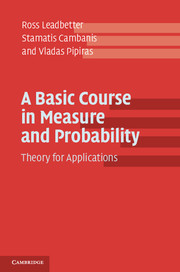Book contents
- Frontmatter
- Contents
- Preface
- Acknowledgements
- 1 Point sets and certain classes of sets
- 2 Measures: general properties and extension
- 3 Measurable functions and transformations
- 4 The integral
- 5 Absolute continuity and related topics
- 6 Convergence of measurable functions, Lp-spaces
- 7 Product spaces
- 8 Integrating complex functions, Fourier theory and related topics
- 9 Foundations of probability
- 10 Independence
- 11 Convergence and related topics 223
- 12 Characteristic functions and central limit theorems
- 13 Conditioning
- 14 Martingales
- 15 Basic structure of stochastic processes
- References
- Index
1 - Point sets and certain classes of sets
Published online by Cambridge University Press: 05 June 2014
- Frontmatter
- Contents
- Preface
- Acknowledgements
- 1 Point sets and certain classes of sets
- 2 Measures: general properties and extension
- 3 Measurable functions and transformations
- 4 The integral
- 5 Absolute continuity and related topics
- 6 Convergence of measurable functions, Lp-spaces
- 7 Product spaces
- 8 Integrating complex functions, Fourier theory and related topics
- 9 Foundations of probability
- 10 Independence
- 11 Convergence and related topics 223
- 12 Characteristic functions and central limit theorems
- 13 Conditioning
- 14 Martingales
- 15 Basic structure of stochastic processes
- References
- Index
Summary
Points, sets and classes
We shall consider sets consisting of elements or points. The nature of the points will be left unspecified – examples are points in a Euclidean space, sequences of numbers, functions, elementary events, etc. Small letters will be used for points.
Sets are aggregates or collections of such points. Capital letters will be used for sets.
A set is defined by a property. That is, given a point, there is a criterion to decide whether it belongs to a given set, e.g. the set which is the open interval (−1, 1) on the real line is defined by the property that it contains a point x if and only if |x| < 1.
A set may be written as {x: P(x)} where P(x) is the property defining the set; e.g. {x: |x| < 1} is the above set consisting of all points x for which |x| < 1, i.e. (−1, 1).
In any given situation, all the points considered will belong to a fixed set called the whole space and usually denoted by X. This assumption avoids some difficulties which arise in the logical foundations of set theory.
Classes or collections of sets are just aggregates whose elements themselves are sets, e.g. the class of all intervals of the real line, the class of all circles in the plane whose centers are at the origin, and so on. Script capitals will be used for classes of sets.
Information
- Type
- Chapter
- Information
- A Basic Course in Measure and ProbabilityTheory for Applications, pp. 1 - 20Publisher: Cambridge University PressPrint publication year: 2014
